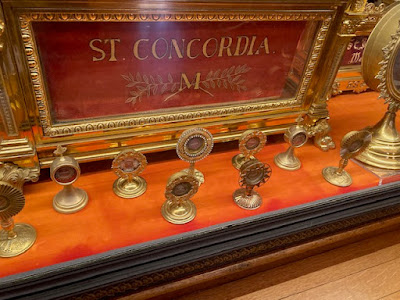“Truly I tell you, if you have faith as small as a mustard seed, you can say to this mountain, 'Move from here to there,' and it will move. Nothing will be impossible for you.”
(Mt 17:20-21)
Anyone can have faith. It doesn't require any capital, nor social standing, nor skills or credentials, and doesn't depend on your class or caste. What faith requires is love and trust in a good and loving God who is in control of everything and who wants to fill our cup to overflowing (Ps 23:5), and who will not give us a stone when we ask for bread (Mt 7:9-11). Faith is a gift that is freely given to those who humbly ask for it.
I really should at this point start a separate tag for miracle stories. God is so good to us, but also to our friends who we pray for who ask for divine favors. From houses to jobs to lawsuits to injuries to the grace of a happy death, the good Lord, his Mother and his saints have come through for us in both big and little ways.
So far, we had:
-lawsuit miracle (St. Jude), 2009
-housing miracle (St. Joseph), 2015
-conversion and baby miracle (Our Lady of the Miraculous Medal; St. Catherine Laboure), 2018
-injury related miracle (SOG Francis Houle), 2019
-injury related miracle (friend's son) (SOG Francis Houle), 2022
-grace of a happy death (St. Mary Margaret Alacoque), 2022
-job miracle for a friend (St. Joseph the Worker) 2023
-conversion miracle, cancer miracle (SOG Francis Houle), 2023
Now, these are miracles to us. They may not have the Vatican investigating the details, but for our family and friends, it is enough, and a memorial altar to buoy our faith (Joshua 4:1-7). We know God was working in these situations by our faith and trust in His power
The latest is a neat story of a friend who asked for prayers while I was at the relic chapel on behalf of a friend of hers who was in a tough spot and needed help. She texted me:
"My friend B.--her son is a first year seminarian with the ICKSP in Italy. They have tickets to fly over for his cassock ceremony next week (have never been overseas and miss their son) and their passport application hasn't gone through. It's down to the wire and not looking good but for divine intervention."
Yikes! I promised to pray for the intercession of St. Francis Paola, one of the many saints whose relic was present where I was praying last week. He was Italian, and a mighty intercessor to the point where it was kind of ridiculous how many miracles he worked.
I also remembered, though, an article I had read about Mother Teresa's "Flying Novena", a consecutive ten-Memorare prayer (nine Memoraes in a row, plus a tenth "thank you in advance for answering this prayer" added to the end, so great was her faith in Our Lady's intercession. Anyway, this was a good and faithful modified-novena for time sensitive emergencies, so it seemed perfect. Plus, it seemed applicable to the passport situation for my friend's friend, given that in the NC Register article a priest told the story:
Impossible Becomes Possible
Mother Teresa “definitely inspired the same devotion in her sisters, but also in others,” Father Kolodiejchuk affirmed.
Father Louis Merosne, newly appointed pastor at St. Anne’s Cathedral in Anse-à-Veau, Haiti, had his own amazing experience with the Flying Novena. Once he had planned to join the Missionaries of Charity priests, had been accepted, and spent two years with them in Mexico before he said God made it clear he was to serve in Haiti instead. Active with youth and young adult conferences such as at Franciscan University in Steubenville, in 2008 he was going to World Youth Day in Sydney, Australia. On his return he was to have one-day stop in Boston, then catch a flight to the Netherlands where he was to speak at a conference.
“I went to the consulate in Boston to apply for their visa,” he said. “They told me I would have to leave my passport in order to put the visa on it. I couldn’t because I had to leave for Sydney.” Boston insisted the central office could not process anything until they had his passport. “I told them I’m going to the Netherlands and I had one day in between my two travels. They said, Sorry.”
Calling from Sydney about the visa, he got a surprise. “They told me, by the way, they don’t do urgent, express applications. They need at least two weeks once they get the passport.” He told them the conference would be over by then. “Sorry.”
Returning to Boston, he took an early train to New York City where the main consulate office was. He continued, “I went to the office to explain the situation again, but they said, ‘You can leave your passport and pick it up in two weeks. We’re very sorry.’”
This was the day he was to travel to the Netherlands, and he had to get back to Boston board his booked flight that evening which would then fly back to New York on the first of two legs to the Netherlands.
“Maybe if I call the airline, they would allow me to get on at New York for the Netherlands flight,” he thought. The airline’s answer? “No, we don’t do that. If you don’t get on your flight in Boston, you’re entire flight will be cancelled. You cannot get on in New York.”
Still in the consulate, he called the airlines a second time hoping to find a sympathetic listener. But he again he was told the airline could not cancel one leg of the flight.
At that point Father Merosne knew it was time to say a Flying Novena. He said, “Only you, Blessed Mother, can help me do this if it is God’s will. I said the novena.
Shortly after he finished, “the representative from the consulate called me over and said, ‘Give me your passport.’ And within minutes I had my visa! And I called the airlines a third time, and this time the lady said, ‘We don’t do this, but we’ll de this once for you. Get in the plane in New York.’”
“Once I said that [Flying] Novena, it was all over for them,” Father Merosne said with a much joy. “That which was impossible for man was quite possible for our Blessed Mother.”
“I am a believer,” he said of the Flying Novena.
There is a saint for every situation, someone who understands and is close to you, and God can do anything. We should always pray with sincere trust and not doubt. And we should always pray that it is in accordance with His divine will.
"But when you pray, you must believe and not doubt at all. Whoever doubts is like a wave in the sea that is driven and blown about by the wind. If you are like that, unable to make up your mind and undecided in all you do, you must not think that you will receive anything from the Lord." (Ja 1:6-8)
I figured if our Lord wanted them on that plane with passport in hand, Our Lady could make it happen. If for whatever reason He didn't, there would be good reason--maybe the plane would crash in the ocean and He wanted to save them from that fate! Whatever His will, God sees all things, while we only see through a glass darkly (1 Cor 13:12).
Case in point from St. Alphonsus:
"There is a similar account by Surio to the effect that a certain blind man obtained the restoration of his sight by praying to St. Bedasto, bishop. Thinking the matter over, he prayed again to his heavenly patron, but this time with the purpose that if the possession of his sight were not expedient for his soul, that his blindness should return. And that is exactly what happened -- he was blind again. Therefore, in sickness it is better that we seek neither sickness nor health, but that we abandon ourselves to the will of God so that he may dispose of us as he wishes. However, if we decide to ask for health, let us do so at least always resigned and with the proviso that our bodily health may be conducive to the health of our soul. Otherwise our prayer will be defective and will remain unheard because our Lord does not answer prayers made without resignation to his holy will. Sickness is the acid test of spirituality, because it discloses whether our virtue is real or sham." (Uniformity With God's Will)
Anyway, I made a point to tell my friend that I would pray the Flying Novena will full confidence, and also to St. Francis Paola, but that I wanted her to please inform me of the outcome of her friend's situation so we could give glory to God for the intercession.
Wouldn't you know, Our Lady came through, and the divine favor of St. Mother Teresa and St. Francis Paola (I don't know who to attribute to, so thank you both!) came through in the clutch.




















.JPG)


